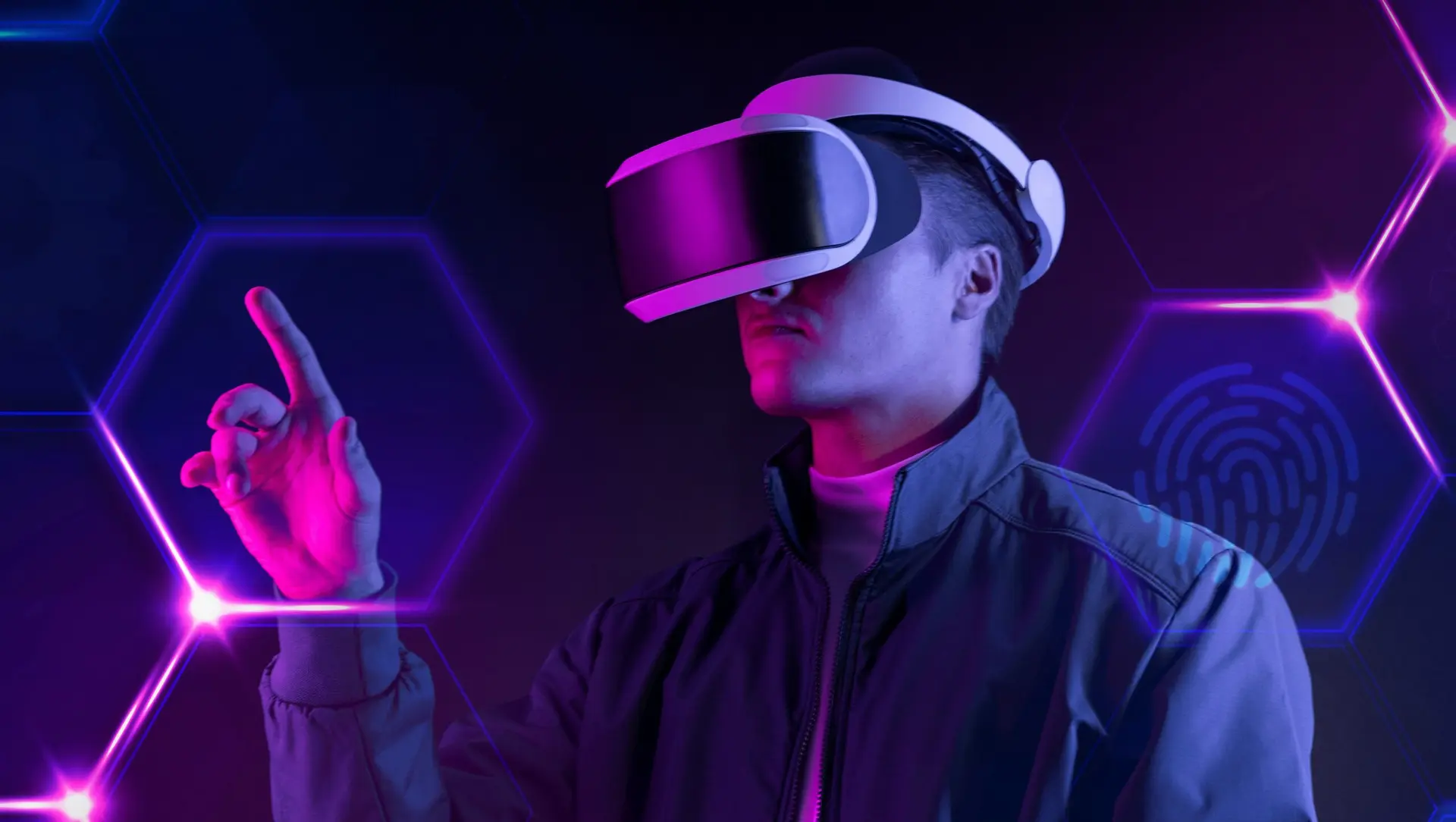Imagine slipping on a headset and suddenly finding yourself in another world. One moment you are sitting in your living room, and the next you are standing on a battlefield, surrounded by sound, movement, and endless possibilities. Now imagine your phone guiding you to hidden treasures in your local park or helping you battle digital creatures that appear right in front of you.
This is not a glimpse of the future. It is what gaming already feels like in 2025. Augmented Reality (AR) and Virtual Reality (VR) have moved from being futuristic ideas to becoming some of the most exciting technologies shaping how games are played today.
For years, gaming was about what happened on a screen. Now, the screen is everywhere. AR brings the game into your world, blending digital content with your surroundings. VR takes you entirely into a new one, letting you move, react, and experience games in ways that were impossible before.
Together, AR and VR are not just changing how we play; they are changing how we connect with stories, friends, and entire virtual communities. Whether it is catching a creature on your street, fighting alongside your friends in a digital arena, or attending an in-game concert that feels almost real, these technologies are redefining what gaming means.
So how exactly are AR and VR transforming the gaming industry? Let’s break down what these technologies are, how they are used in games, and why they are shaping the future of interactive entertainment.
AR, VR and the Metaverse: What Do They Mean for Gaming?
Before looking at how these technologies are transforming gaming, it helps to understand what they actually are.
Augmented Reality (AR) adds digital elements to your real-world surroundings. It layers computer-generated visuals, objects or information over what you see through your phone, tablet, or AR glasses. Games that use AR allow you to interact with virtual characters and environments while still seeing the physical world around you.
Virtual Reality (VR) creates a completely digital environment. With a headset and motion controllers, players can move, look around, and interact as though they are physically inside the game. VR places the player at the centre of the action, making every movement and decision feel immediate and real.
The metaverse brings AR and VR together in shared digital spaces where players can socialise, build, and play across connected worlds. While still developing, metaverse-style games such as Roblox, Fortnite and VRChat show what this future might look like.

What Is AR in Gaming?
When people ask “what is AR in gaming?” or “what are augmented reality games?” they’re usually asking how these games differ from traditional ones.
In simple terms, augmented reality video games use the real world as part of the gameplay. For example, you might use your phone’s camera or AR glasses to see digital objects layered on your surroundings, such as a virtual monster hiding behind your sofa or a treasure chest on your street corner.
A classic example is Pokémon Go, which encouraged players to move outdoors, explore their neighbourhoods, and catch virtual Pokémon that appeared through their phone cameras. The game proved how engaging it could be when digital and physical play come together.
Since then, AR gaming has developed rapidly. Titles like The Witcher: Monster Slayer, Ingress Prime and Pikmin Bloom have shown that AR can deliver strong storytelling, real-world movement, and community engagement all at once.
Players often ask, how is augmented reality used in gaming today?
It now appears in multiple forms:
- Location-based gameplay where players move in the real world to complete objectives.
- Object recognition where the game reacts to real-world surfaces or items.
- Social AR games that connect players through shared virtual experiences.
- AR-enhanced console titles where cameras or sensors project digital visuals onto real surroundings.
The beauty of AR is that it makes gaming active and social rather than something confined to a screen. It turns the world around players into part of the story.
How Virtual Reality Is Revolutionising Gaming
If AR brings the game into your space, VR takes you into the game’s world. This is where gaming feels most immersive. With VR headsets becoming lighter, more affordable, and equipped with sharper visuals, the experience is far smoother than it was only a few years ago.
VR gaming lets players become the character. In action titles such as Half-Life: Alyx or Asgard’s Wrath 2, you can physically move, dodge, or interact using natural hand gestures. In simulation games like Beat Saber or Superhot VR, movement becomes the main gameplay mechanic.
So, how is virtual reality revolutionising gaming?
- Realism and immersion: Players no longer watch a world; they live inside it.
- Physical interaction: Games require movement, creating a more active experience.
- New genres: Developers are experimenting with storytelling and design that only works in VR, from fitness-based adventures to virtual social platforms.
- Emotional engagement: Being inside a world builds stronger emotional connections between players and stories.
VR is also expanding beyond entertainment. Competitive e-sports, training simulators, and creative tools are now part of the VR ecosystem, which means gaming skills are blending with other real-world applications.
Growth of the AR and VR Gaming Market
The AR and VR gaming market has grown significantly in recent years. Industry reports estimate that the augmented reality gaming market reached about US$14.2 billion in 2024, and it is projected to hit US$141.7 billion by 2033 at a CAGR of roughly 25.9%.
For virtual reality in gaming, the market size is estimated at about US$32.5 billion in 2024 and expected to reach US$41.1 billion in 2025.
Hardware is also gaining momentum: the global AR and VR headsets market was estimated at US$12.46 billion in 2024 and projected to reach US$16.9 billion in 2025, with long-term forecasts stretching over US$260 billion by 2034.
The success of devices such as PlayStation VR2, Meta Quest 3, and Apple Vision Pro has accelerated interest in immersive gaming. These devices combine high-resolution visuals with eye-tracking, spatial awareness, and realistic audio, creating a deeper sense of presence.
Independent developers are also contributing to this growth. Modern tools like Unreal Engine and Unity now include affordable AR and VR development kits, allowing smaller studios to create high-quality immersive experiences.
For anyone thinking about developing an augmented reality gaming strategy, the focus is now on blending accessibility with innovation. Games that connect physical activity, social play, and real-world rewards tend to perform best because they attract both casual and dedicated audiences.

Challenges the Industry Still Faces
Despite its success, the AR and VR gaming industry faces a few hurdles.
Hardware cost: Quality headsets and devices remain relatively expensive compared to traditional consoles. This limits how many players can join in.
Accessibility: Not all players have the physical space or comfort level for extended VR sessions. Developers are working on lighter designs, better motion tracking, and features that reduce motion sickness.
Content development: Creating realistic 3D environments and interactions requires more time and resources. Smaller developers often need support to produce games at the same quality level as major studios.
Adoption rate: While millions now own AR and VR devices, it is still a fraction of the global gaming audience. Continued hardware improvements and lower prices will help close that gap.
Even with these challenges, most industry experts agree that AR and VR will remain one of the fastest-growing areas of gaming for the next decade.
What Comes Next for AR and VR in Games?
AR and VR are shaping a new era of gaming where reality and imagination meet. The next wave of growth will likely focus on mixed reality, where players can shift between virtual and real environments without removing their headset.
You can expect:
- More social experiences where players meet, compete, and attend events inside shared digital spaces.
- Hybrid games that combine AR and VR, letting you switch between exploring your physical world and entering fully virtual spaces.
- Improved accessibility, making immersive gaming possible on smaller, cheaper devices.
- Stronger storytelling, as developers use AR and VR to build emotional and cinematic experiences that feel personal to each player.
Will AR and VR replace consoles or PC gaming entirely? Probably not in the near future. But they are no longer a side category. They are now one of the main ways people experience games, offering something traditional screens cannot: presence, interaction, and physical engagement.
Final Thoughts
The question is no longer whether AR and VR will shape the future of gaming. They already are. What began as experiments a decade ago has evolved into a major part of the industry that continues to grow and inspire creativity.
For studios and publishers, this means new opportunities to reach players who want to feel connected, active, and part of the story. For gamers, it means experiences that break the limits of the screen and bring imagination to life.
If you are developing an AR or VR game and want to reach your audience effectively, The Game Marketer can help craft a strategy that fits your vision and gets your title noticed by the right players.



